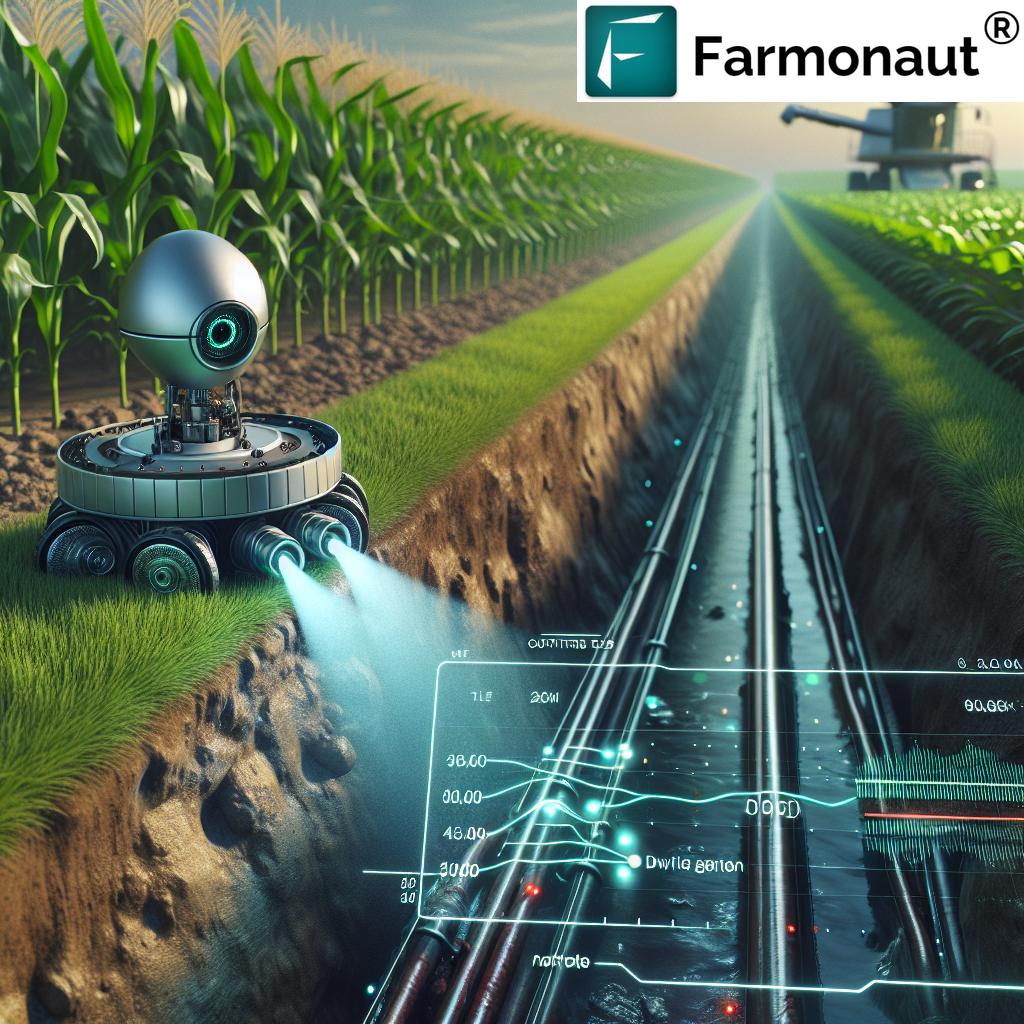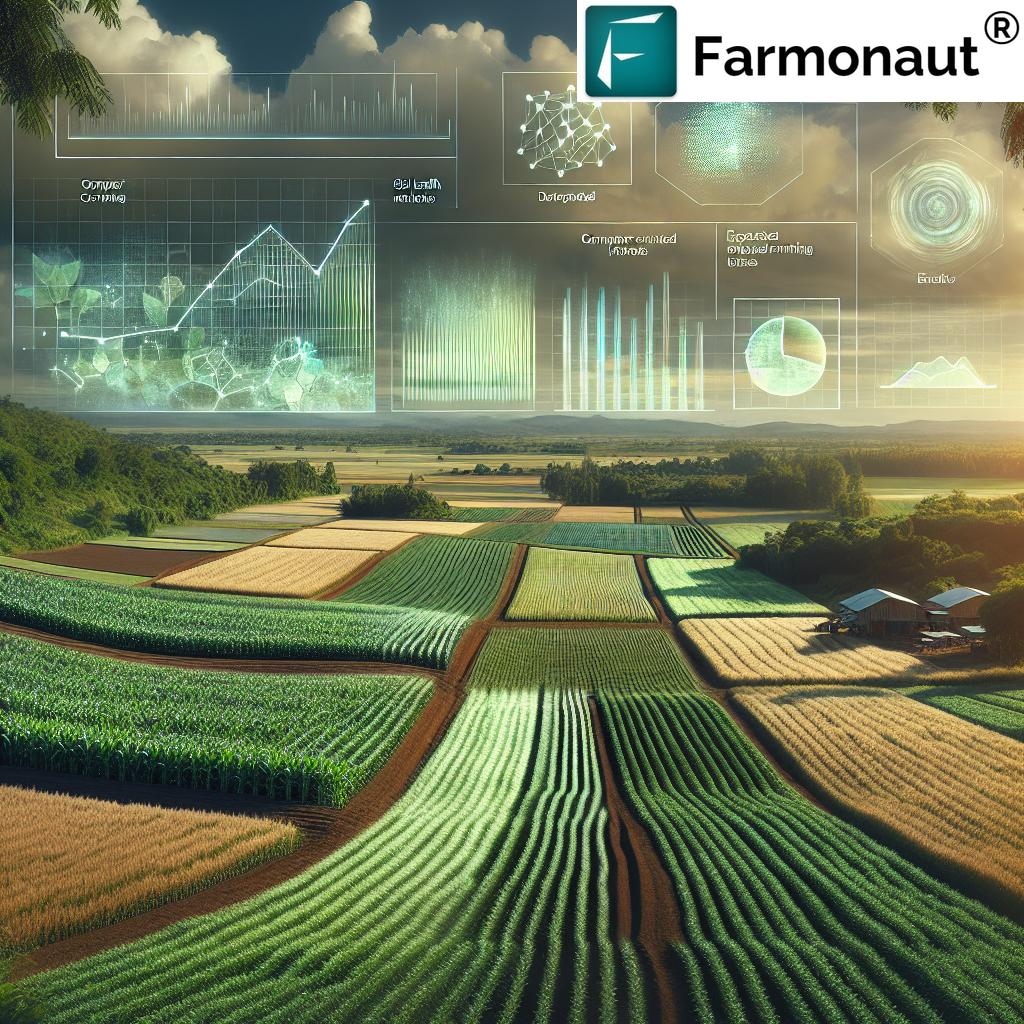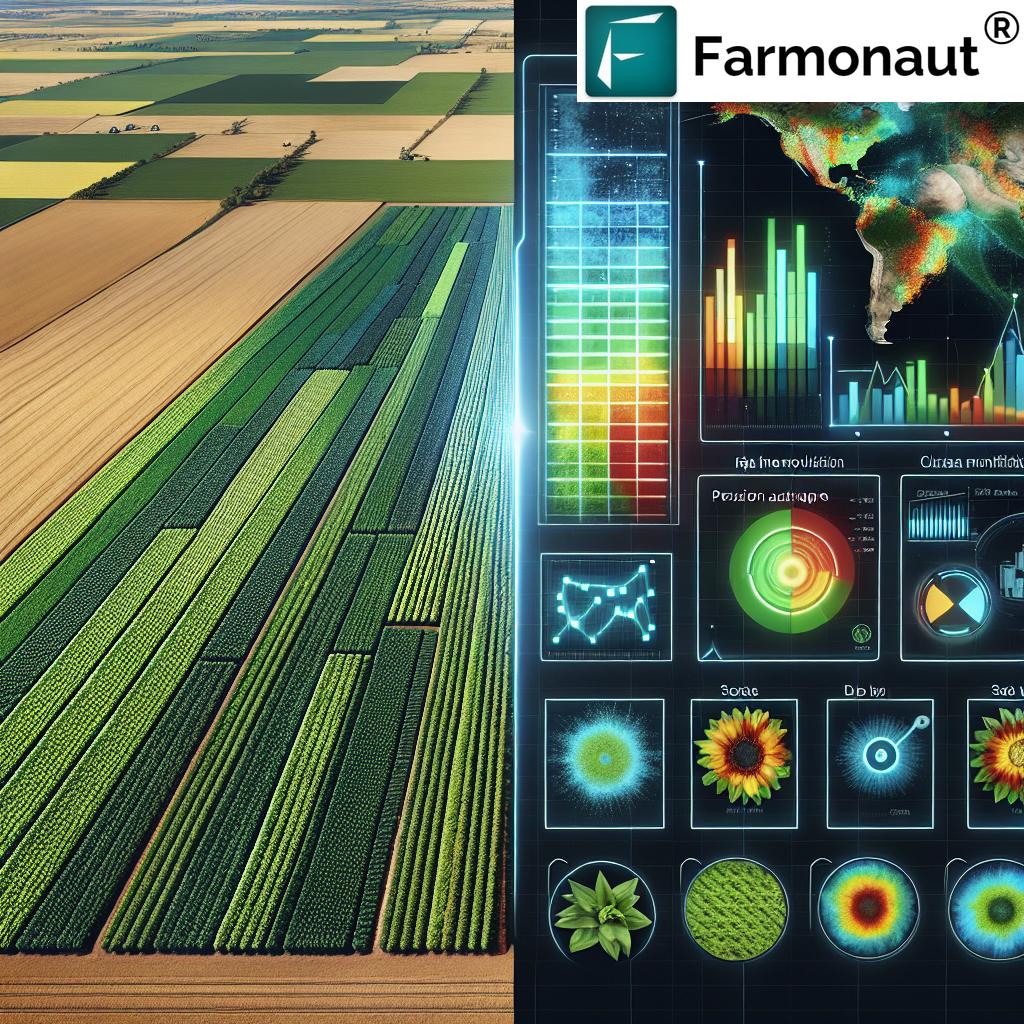Farming Jobs 2025: Top Opportunities in Smart Agriculture
- The Evolving Landscape of Agricultural Farming Jobs in 2025
- Trivia: Farming Jobs & Technology
- Diversity & Scope of Agricultural Farming Jobs
- Technological Impact on Farming Jobs in 2025
- Comparative Outlook Table: Key Jobs in Smart Agriculture 2025
- Sustainability and Green Jobs in Agriculture
- Challenges Facing the Agricultural Employment Market
- Essential Skills & Training for Future Agriculture and Farming Jobs
- Smart Agriculture: The Role of Farmonaut’s Technology
- Download & Access Satellite-Driven AgTech Apps
- Frequently Asked Questions (FAQ)
- Conclusion
The Evolving Landscape of Agricultural Farming Jobs in 2025
The agricultural sector remains a cornerstone of the global economy, providing food security, raw materials, and rural employment. As we move into 2025, the landscape of agricultural farming jobs is experiencing significant transformation, driven by rapid advancements in technology, evolving market demands, and the imperative for sustainability. Understanding the shifting dynamics of jobs in farming is essential for policymakers, job seekers, and stakeholders who are committed to sustainable development and maximizing production efficiency in agriculture.
“By 2025, over 60% of new farming jobs will require advanced tech skills in data analysis and automation.”
Diversity & Scope of Agricultural Farming Jobs in 2025
The agricultural and farming jobs sector in 2025 shows remarkable diversity—both in job roles and skill requirements. While traditional jobs like planting, harvesting, and livestock care continue to play a critical role, the scope has expanded to include highly specialized positions involving technology, management, and data analysis.
- Farming jobs for machine operators and equipment mechanics have evolved to require an understanding of digital interfaces and smart machinery.
- Precision agriculture jobs now encompass roles such as drone operators, data analysts, and IoT system managers.
- Emerging agritech specialists blend agronomy with data science, optimizing crop yields and promoting sustainable farming practices.
The agriculture farming jobs landscape is thus defined by both skilled and unskilled jobs, offering opportunities to workers of all backgrounds—including operators, irrigation specialists, crop scientists, agricultural economists, and unskilled laborers looking to upskill in a changing market.
Key Categories of Agriculture and Farming Jobs in the Evolving Landscape
The transition toward smart agriculture is most evident in the following job categories:
- Technical Operators & Machine Specialists: Proficient in operating GPS-guided tractors, drones, and automated irrigation systems.
- Agri-Data Analysts & Precision Farming Experts: Analyze satellite, sensor, and weather data to provide actionable insights on resource use and crop management.
- Sustainable Farming Consultants: Guide farms in integrating regenerative practices and compliance with climate and sustainability standards.
- IoT Systems Managers & Robotics Engineers: Oversee automated systems that optimize input usage, reduce labor, and enable real-time monitoring.
- Farm Management & Advisory Specialists: Bridge business management with technological innovations to maximize production efficiency while ensuring environmental responsibility.
These new roles require a blend of traditional agricultural knowledge and technological expertise, propelling the sector toward a data-driven, sustainable future.
Technological Impact on Farming Jobs in 2025
In 2025, the profound technological transformation underway in agriculture is rapidly reshaping jobs in farming. Automation, AI, machine learning, and precision digital tools are now integral parts of modern farms, fundamentally altering the relationships between farmers, their land, and the food they produce.
Precision Agriculture: From Manual Labor to Smart Decision-Making
Precision agriculture leverages satellite data, drones, IoT devices, and AI-powered analytics to optimize every aspect of the farming process—from planting and irrigation to harvesting and pest control.
- Satellite and drone imagery: Delivers real-time field monitoring, identifying crop health variability, water stress, and early signs of pest or disease outbreaks.
- AI-based predictive analytics: Helps in forecasting yields, optimizing fertilizer application, and reducing resource waste.
- Automation: Robotics now undertake repetitive and physically taxing tasks, liberating human labor for higher-level roles such as monitoring, system management, and analytical tasks.
These technologies reduce the need for repetitive manual labor but create mounting demand for skilled workers capable of managing sophisticated systems, troubleshooting, and data interpretation.
Emerging Roles & Essential Skills in Technology-Driven Agriculture and Farming Jobs
Some of the fastest-growing technology-driven job opportunities in agriculture include:
- Drone Operator: Plans and executes drone missions for crop health mapping, pesticide application, and soil analysis.
- Data Analyst (AgriTech): Utilizes agricultural big data to build actionable reports on yields, soil quality, irrigation needs, and pest threats.
- Robotics Technician: Programs, maintains, and repairs autonomous vehicles and harvest robots operating in modern farms.
- IoT Systems Engineer: Manages interconnected sensors throughout the farm for precision monitoring and automated response systems.
- AI-Based Advisory Specialists: Merge agronomic knowledge with AI tools to deliver actionable recommendations to farm operators.
With each technological advancement, new farming jobs are introduced, upskilling existing labor and opening opportunities for tech-savvy professionals eager to transform agriculture.
Comparative Outlook Table: Key Farming Jobs in Smart Agriculture 2025
| Job Role | Description | Key Skills Required | Estimated Average Salary (2025, USD) | Technology/Tools Used |
|---|---|---|---|---|
| Precision Agriculture Technician | Implements and maintains precision ag systems: GPS, sensors, and variable-rate equipment for planting, spraying, and fertilizing. |
IoT integration, GPS mapping, equipment calibration, agronomy basics |
$55,000–$77,000 | GIS, farm management software, sensor arrays, precision planters |
| Drone Operator | Conducts aerial surveys for monitoring crop health, irrigation efficiency, and application of inputs. |
UAV piloting certification, image analysis, mapping, regulatory compliance, basic maintenance |
$45,000–$70,000 | Drones (UAV), analytics software, multispectral imaging, Farmonaut Satellite Platform |
| Data Analyst – AgriTech | Analyzes data from sensors, satellite imagery, and operational records to optimize farm decisions. | Statistics, programming (Python/R), machine learning, agri-knowledge, data visualization | $77,000–$100,000 | Farmonaut’s data platform, satellite APIs, big data tools, AI advisory systems |
| Sustainable Farming Consultant | Advises on regenerative, organic, or climate-smart practices and audits farms for sustainability KPIs. | Sustainability, agronomy, communication, environmental compliance, carbon footprint analysis | $60,000–$85,000 | Carbon Footprinting Tools, sustainability platforms, compliance trackers |
| IoT Systems Manager | Oversees connected devices measuring soil, weather, and machinery data; troubleshoots and updates field networks. | Network engineering, IoT device programming, systems integration, troubleshooting, sensors | $70,000–$100,000 | Sensor networks, IoT platforms, automated controller software |
“Smart agriculture is projected to create 200,000+ specialized roles in precision farming and agri-robotics by 2025.”
Sustainability and Green Jobs in Agriculture
As sustainability becomes an ever more urgent priority for the sector, green jobs in agriculture are experiencing explosive growth. In 2025, there’s widespread momentum toward:
- Regenerative and climate-smart agriculture: Creating new jobs in composting, organic certification, and carbon footprinting.
- Agroforestry and biodiverse farming: Hiring consultants and managers to oversee sustainable land integration and tree-crop systems.
- Water and soil conservation jobs: Specialists in precision irrigation and soil health monitoring are essential to optimize resource use.
- Traceability managers: Professionals leveraging blockchain-based traceability (see Farmonaut’s product traceability solution) ensure transparency and authenticity in supply chains.
These opportunities reflect a global shift towards sustainable, efficient, and transparent farming jobs—making sustainability not only an environmental goal but a growing field of employment in its own right.
Challenges Facing the Agricultural Employment Market
While technology-driven farming jobs are proliferating, the sector still grapples with enduring challenges:
- Seasonal and climate-induced volatility: Extreme weather and shifting seasons create fluctuations in job security and recruitment.
- Aging workforce & rural-urban migration: Many regions face a shortage of younger workers as urban employment lures talent away from rural areas.
- Skills gap: The need for data literacy, digital skills, and technical proficiency outpaces the availability of qualified workers.
- Education & training gaps: Insufficient investment in vocational training leads to underutilized labor and lower innovation rates.
- Socio-economic barriers: Access to training, technology, and investment in rural regions can be limited, furthering the divide.
The agricultural and farming jobs landscape in 2025 is being shaped as much by its challenges as by its opportunities—necessitating targeted efforts in education, policy, and technology adoption.
Essential Skills & Training for Future Agriculture and Farming Jobs
Given the rapid technological transformation, agricultural farming jobs now require a broader set of skills than previously imagined. The ability to blend agronomic knowledge with digital fluency is crucial:
- Technical Proficiency: Operating smart machinery, drones, sensor systems, and AI-driven tools is now the norm rather than the exception.
- Data Analysis: The ability to interpret imaging, soil data, weather analytics, and real-time machine feedback is central to many roles.
- Problem-Solving: Automation, robotics, and AI present troubleshooting challenges; skills in maintaining and optimizing such systems are valuable.
- Sustainability Literacy: Understanding ecological impacts, carbon management, and regulatory best practices is increasingly requisite.
- Flexibility & Continuous Learning: As the sector evolves, ongoing training remains a career-long requirement.
Farmers, job seekers, and industry specialists benefit by engaging in:
- Online courses and certifications in precision agriculture, drone operation, and digital farm management.
- Hands-on internships with agri-tech companies and exposure to real-world application of smart farming practices.
- Continuous learning platforms and advisory systems—for instance, those powered by AI-driven tools such as Farmonaut’s Jeevn AI (see more about our large scale farm management and crop plantation & forest advice solutions).
Smart Agriculture: The Role of Farmonaut’s Technology
As the agricultural sector undergoes significant transformation, Farmonaut’s satellite-driven technologies stand at the forefront of smart agriculture solutions. We enable a technology-driven workforce and unlock new agriculture and farming jobs by making powerful insights affordable and accessible via our Android, iOS, web apps, and APIs.
Farmonaut Services & Opportunities for Agricultural Jobs
- Satellite-Based Monitoring: Real-time crop, soil, and infrastructure monitoring aids decision-making and creates jobs in data analysis, drone piloting, and agricultural advisory.
- AI & Machine Learning Advisory: AI-powered farm management supports roles in tailored agricultural consultancy and efficiency optimization.
- Blockchain Traceability: Supply chain transparency opens management jobs in compliance, product authentication, and digital auditing.
- Fleet & Resource Management: Optimizes machinery use in fleet management, reducing operational costs and creating demand for skilled logistics operators and system analysts.
- Environmental Impact Tracking: Measuring carbon footprints supports the fast-growing field of agri-sustainability, beneficial for consultants and compliance officers.
Developer Tools & Integration
-
API integration empowers software developers and businesses to merge satellite insights with their platforms.
Farmonaut API |
API Developer Docs
Farmonaut Subscription Options
Interested in upskilling or managing your farm digitally? Access affordable, scalable subscription options via our secure payment portal below.
Download & Access Satellite-Driven AgTech Apps
To raise productivity, sustainability, and traceability in farming jobs, easy-to-use tools and platforms are key. Gain instant access to Farmonaut’s suite of leading satellite-driven farm management, monitoring, and advisory applications:
-
Farmonaut Web & Mobile App:
Access NDVI, crop health monitoring, and receive AI-based farming advice directly from your phone or browser. Essential for precision farming and digital farm management. -
Crop Loan & Insurance Verification:
Learn how satellite verification can ease access to agricultural finance.
Frequently Asked Questions (FAQ): Farming Jobs in 2025
What are the most in-demand farming jobs in 2025?
The fastest-growing farming jobs include precision agriculture technicians, drone operators, data analysts in AgriTech, sustainable farming consultants, and IoT system managers. Demand for roles combining technical and agricultural skills skyrockets as farms adopt digital technologies.
Do I need technical skills for all agriculture farming jobs now?
Not all, but most high-growth farming jobs in 2025 require digital literacy—such as working with farm management software, smart machines, and data analysis tools. Upskilling in these areas is encouraged for better employment prospects.
How can technology help make agricultural jobs more sustainable?
Technology—via AI, IoT, and satellite data—enables more precise resource use, lower inputs and emissions, and real-time monitoring. This improves both farm efficiency and environmental stewardship, opening diverse green jobs in agriculture.
Where can I access smart farming management tools?
Farmonaut provides accessible solutions for digital farm, soil, fleet, and sustainability management. Sign up via our web, Android, or iOS apps.
Which Farmonaut solutions help agricultural employment markets?
Our platform—using satellite and AI—delivers tools for crop health monitoring, carbon footprint tracking, fleet logistics, traceability, and largescale farm management—helping users from smallholders to businesses optimize productivity and sustainability.
Is there support for unskilled laborers in the evolving agriculture and farming jobs market?
Yes. While advanced skills are increasingly valuable, there remain entry-level and support roles in field operations, logistics, and support services. Many programs and platforms—including those powered by Farmonaut—offer training and advisory support to bridge knowledge gaps and open career pathways.
Conclusion: The Future of Agricultural Farming Jobs in 2025 & Beyond
The agricultural and farming jobs market in 2025 is both dynamic and full of promise. Driven by technology, data, and sustainability, the sector is advancing beyond its traditional labor-intensive roots into a future where digital fluency is as crucial as agronomic knowledge. For job seekers, this evolving landscape of agricultural jobs offers not only security and new forms of employment but also career growth in areas such as precision agriculture, data analytics, and sustainability.
At Farmonaut, we are committed to making satellite-based, AI-driven insights accessible for all—empowering individuals, businesses, and governments to meet the challenges and seize the opportunities of tomorrow’s food systems. Whether you’re a farmer, analyst, advisor, or policy planner, the future of agriculture and farming jobs is smart, sustainable, and digital.
Let’s embrace the challenge, cultivate innovation, and grow together—ensuring food security, rural opportunity, and environmental stewardship for generations to come.
















